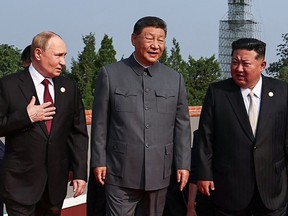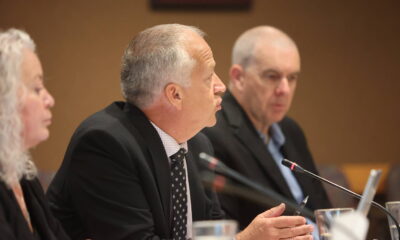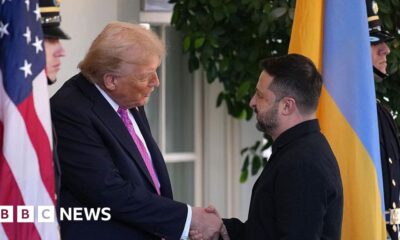Science
Xi and Putin Discuss Future of Human Life in Candid Moment

A hot mic incident during a live news broadcast captured a remarkable conversation between Chinese leader Xi Jinping and Russian President Vladimir Putin as they walked with North Korean leader Kim Jong Un in Beijing. Their exchange, which took place on March 15, 2024, touched upon the possibilities of extending human life through advancements in science, including organ transplants and biotechnology.
The brief dialogue occurred while the leaders attended a military parade commemorating the 80th anniversary of the end of World War II. As they walked along the red carpet towards the viewing platform at the historic Tiananmen Gate, parts of their conversation were captured, revealing insights into their views on longevity and health.
Initially, Xi was heard discussing the changing perceptions of age, suggesting that living until 70 is no longer considered rare, and that individuals might still feel youthful at that age. Both leaders, who are 72 years old, shared a moment of reflection on the potential for longer life spans. Putin, gesturing animatedly, contributed to the conversation. His words were translated into Chinese, indicating a future where biotechnology could enable organ transplants and even immortality.
The translator conveyed Putin’s comments: “In a few decades, as biotechnology continues to develop, human organs will continue to be transplanted and people will become younger and perhaps even achieve immortality.” This notion prompted a subtle smile from Xi, suggesting an alignment in their thoughts on the subject.
As the audio continued, Xi’s voice could be heard mentioning predictions about living to 150 years old. Although the entirety of the exchange was not clear, it hinted at a shared vision of the future. An interpreter later translated another remark, stating, “There are forecasts that in this world a person will live up to 100.”
The footage was provided by the parade media centre and disseminated to international news agencies, including The Associated Press. The parade itself displayed a range of military capabilities, highlighting China’s advancements under Communist Party rule.
Following the parade, Putin addressed the media during a news conference, confirming that Xi had indeed raised the topic of life expectancy. He remarked, “The chairman mentioned this,” referring to Xi’s earlier comments. Putin elaborated on the importance of modern health and medical technologies, noting that surgical advancements related to organ replacements inspire hope for a different kind of longevity.
“Modern health and medical technologies, surgical procedures connected with organ replacements and so on give humanity reason to hope that an active life can continue differently than now,” he stated. Putin also acknowledged that while life expectancy varies by country, the trend shows a significant increase globally.
Neither leader has indicated any plans to step down from power. In contrast to his predecessors, who retired after ten years, Xi abolished term limits in 2018 and secured a third term as president in 2023. This consolidation of power allows Xi to continue pursuing ambitious policies, including those surrounding health and biotechnology.
The candid exchange between Xi and Putin not only reflects their personal views on life and longevity but also underscores the broader implications of their leadership in shaping the future of health technologies. As global discourse on aging and life expectancy continues to evolve, the insights shared during this unexpected moment may resonate with future discussions on humanity’s potential to extend life significantly.
-

 World3 months ago
World3 months agoScientists Unearth Ancient Antarctic Ice to Unlock Climate Secrets
-

 Entertainment3 months ago
Entertainment3 months agoTrump and McCormick to Announce $70 Billion Energy Investments
-

 Lifestyle3 months ago
Lifestyle3 months agoTransLink Launches Food Truck Program to Boost Revenue in Vancouver
-

 Science3 months ago
Science3 months agoFour Astronauts Return to Earth After International Space Station Mission
-

 Technology2 months ago
Technology2 months agoApple Notes Enhances Functionality with Markdown Support in macOS 26
-

 Top Stories1 week ago
Top Stories1 week agoUrgent Update: Fatal Crash on Highway 99 Claims Life of Pitt Meadows Man
-

 Sports3 months ago
Sports3 months agoSearch Underway for Missing Hunter Amid Hokkaido Bear Emergency
-

 Politics2 months ago
Politics2 months agoUkrainian Tennis Star Elina Svitolina Faces Death Threats Online
-

 Technology3 months ago
Technology3 months agoFrosthaven Launches Early Access on July 31, 2025
-

 Politics3 months ago
Politics3 months agoCarney Engages First Nations Leaders at Development Law Summit
-

 Entertainment3 months ago
Entertainment3 months agoCalgary Theatre Troupe Revives Magic at Winnipeg Fringe Festival
-

 Politics1 week ago
Politics1 week agoShutdown Reflects Democratic Struggles Amid Economic Concerns





















